Tighe & Bond Supports the Work of UMass Amherst Engineers Without Borders Student Chapter in Ghana and Kenya
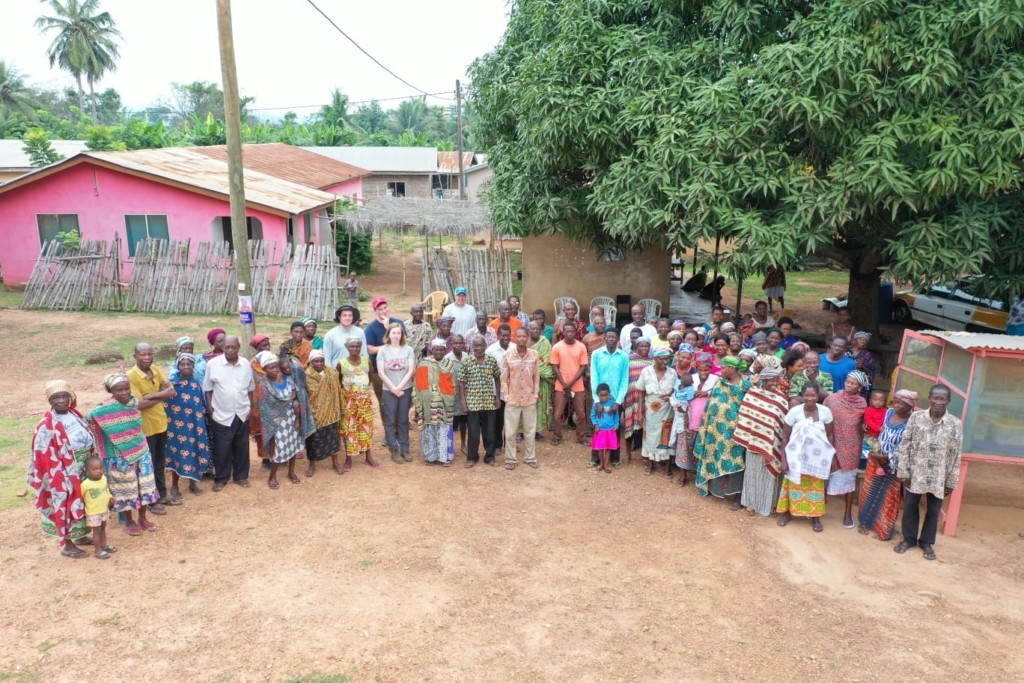
UMass Amherst EWB Student Chapter members with the people of Saviefe-Deme, Ghana.
By Regina Sibilia
Engineering students from UMass Amherst recently presented on the progress of their ongoing work in Ghana and Kenya to employees at Tighe & Bond. These students are active members of the UMass Amherst Student Chapter of Engineers Without Borders-USA (EWB).
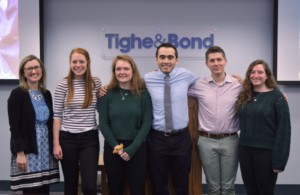
Vice President Tiffany Labrie, PE with UMass Amherst EWB Student Chapter members at their presentation for Tighe & Bond employees.
The national organization of EWB has 286 Chapters with 72-percent of them being student chapters. EWB-USA helps each Chapter find communities in need around the world and then pairs the Chapter with a non-governmental organization (NGO) that supports the mission. Through this program, UMass Amherst students began their work to implement water distribution systems to improve access to clean water for residents in Ghana and Kenya.
Many of the students that presented at the event have made several trips to either Ghana or Kenya and have progressed from volunteering ideas at student-organized meetings to leading teams as Project Managers.
“The first time I made the trip to Kenya I was volunteering for whatever was needed. My second time I had a lot more responsibility and was planning out all the logistics with my team. It was even more rewarding to take on a bigger role,” said Abby Laughlin who was a co-presenter and a Project Manager for the project in Kenya.
Bolstering Students’ Education on Global Issues
From the start, Tighe & Bond and its employees have supported the student-run organization both by volunteering their time and donating funds to the program. Tighe & Bond Vice President and Board Member Tiffany Labrie, PE serves on the Civil and Environmental Engineering Department Advisory Council for UMass Amherst and underscores the importance of the firm’s involvement with the EWB Student Chapter.
“This is a really discerning experience for the students, giving them a global understanding of public health and infrastructure issues. It’s important that firms like ours work with organizations such as EWB because future engineers can continue to work with these organizations while transitioning from students to professionals. You carry the experiences you have as a student with you into the industry. Gaining a lot of perspective on how the community views water issues influences how you approach finding solutions in professional practice,” said Labrie.
Bringing Clean Water to Communities
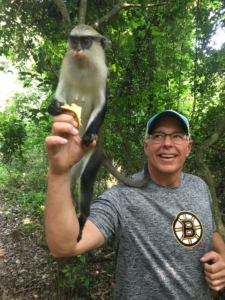
Dr. Wayne Bates, PE in Ghana during the team’s 2019 assessment trip.
Dr. Wayne Bates, PE of Tighe & Bond is another employee who has become involved in this program. He serves as an advisor to the students and he travels with them to Ghana to oversee their work but notes that the students are the ones leading the charge.
“Honestly, the students do it all – they coordinate everything and raise the funds for their work. I guide them with building and executing projects but they create the pre-trip implementation plan and then analyze how that design plan changed after the trip so they can better prepare for the next steps they need to take,” said Dr. Bates.
Dr. Bates has traveled three times with the Ghana Team to the farming community of Saviefe-Deme. When the UMass students began their work in this small community of approximately 500 people 7 years ago, residents were using a stream, boreholes (a deep well) and hand-dug wells as their water resources. Due to poor sanitation, the water resources were not clean to consume and caused water-borne and skin diseases for people. Also, the area’s dry season led to the water supply of the boreholes drying up and many lacked pumps to access more water.
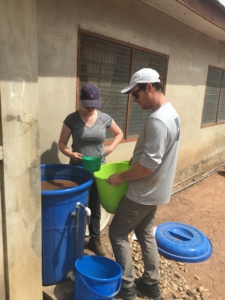
Students installing the bio-sand filtration systems they designed using trash cans to provide clean water to the community.
The first several years the Ghana Team assessed the community’s needs and since then they have been designing and implementing solutions to water sanitation and access issues. In 2017 the team installed two 10,000-liter rainwater collection systems at kindergarten and elementary schools which allows students to remain in class and not fetch river water during the school day for handwashing and sanitation. The next year, the team installed Bio-sand filtration systems made from trash cans that use layers of sand and gravel with hand-made screens to filter and produce clean drinking water. As a rule, the students’ designs are sustainable meaning they are made with local materials and tools that are readily available. This ensures that residents can maintain and repair any systems once the students depart.
The latest trip to Ghana in August 2019 was a ten-day assessment to collect data necessary to design a water distribution system in the community. The team’s work consisted of a combination of topographical, geological, hydrogeological, water quality, and health-related data collection.
The students borrowed a drone from the College of Engineering to take aerial images of the community and produced a detailed topographical map that is being used to model the water distribution system. The team also hired a hydrogeologist to perform a pump test on the borehole, which will be the source water for the distribution system to determine how many taps can be installed on the distribution system. Finally, the team tested the current water quality and interviewed families regarding their overall health to pinpoint which areas of the community are gathering drinking water from the least potable water sources. This will help to determine the optimal positions of distribution centers and the demand at each center. The team plans to go back to Saviefe-Deme in summer 2020 to begin implementing their water distribution system design.
Leadership Roles Shape Future Careers
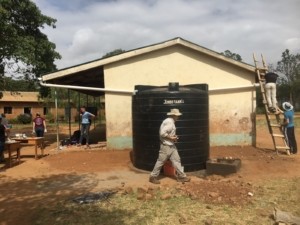
The piping and tank for one of the rainwater catchment systems built in Nguluni, Kenya.
UMass Amherst students have also been traveling south of Nairobi to Nguluni, Kenya (population 4,000) since 2016. The community relied mainly on a sand dam located at the bottom of the mountain for much of its water. The Kenya Team focused on access to water resources and addressing sanitation for the Nguluni community. During the five trips taken over the years, the students installed borehole pumps, made latrine repairs, constructed rainwater catchment systems at local schools, and installed a 2-kilometer water distribution system for the community. In January 2020, surveying and water quality testing were conducted and access to clean borehole water was expanded at several schools. The team also installed handwashing stations at a local nursery school, with the goal of establishing sanitation practices early on with young children.
A 2019 graduate of UMass Amherst, Tighe & Bond Staff Engineer Isabella Cobble traveled with the Kenya Team and was heavily involved with the EWB Student Chapter while pursuing her Civil Engineering degree. By her Junior year, she became a Project Manager for the project in Kenya and went on to be President of the EWB Student Chapter and oversaw both the Ghana and Kenya Teams.
Isabella led weekly meetings and wrote reports that were sent to EWB-USA that outlined project designs and plans in preparation for the trip to Kenya. She also organized hands-on activities that encouraged people to learn about the cultural differences between Ghana, Kenya and the U.S. Isabella’s experience with EWB led her to choose a career in water engineering and she’s continued to make a difference in several communities while working at Tighe & Bond.
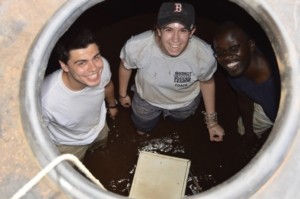
Left to Right: UMass EWB Members Akshay Delity, Isabella Cobble, and Joseph Gikonyo cleaning out a rainwater catchment tank during a trip to Nguluni, Kenya.
“I knew early on in college that Tighe & Bond was a big supporter of EWB, and it was an aspect that drew me into the firm. Once I started working here, I’ve made sure to take advantage of the Make A Difference program which is a great volunteering program. I really value that Tighe & Bond is invested in their employees and how they volunteer their time,” said Cobble.
Holding leadership positions in the UMass Amherst EWB Student Chapter also gave her the ability to carry this knowledge of global issues with her as she shapes her professional career. She recently joined the Boston Professional Chapter of EWB to support their work in Tanzania and is hoping to travel there and offer hands-on assistance in the future.
Cobble passed along this sage advice to other students about the impact of participating in EWB and how it’s continuing to make a difference in her life today.
“I always tell undergrads to get as involved as possible, you never know where your connections can take you. That’s what I did, and I don’t regret it. I even plan to stay involved with EWB as I grow my career at Tighe & Bond.”


